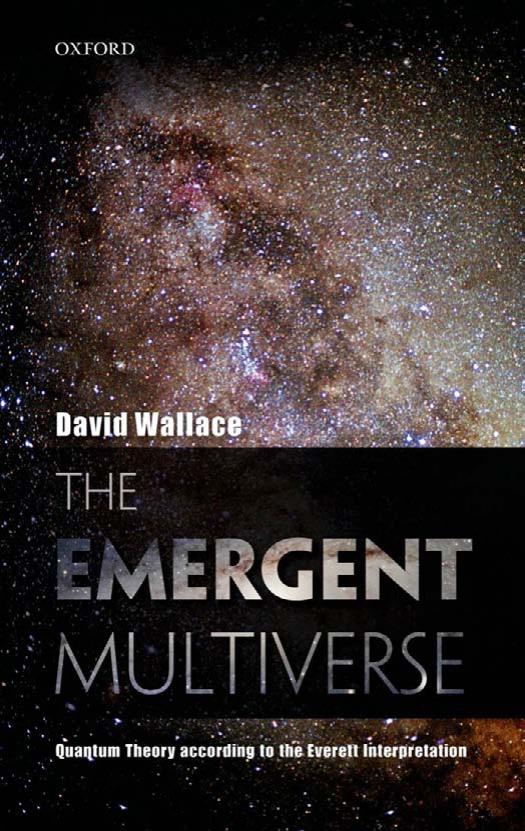The Emergent Multiverse: Quantum Theory according to the Everett Interpretation by David Wallace

Author:David Wallace [Wallace, David]
Language: eng
Format: epub, pdf
ISBN: 9780198707547
Publisher: OUP Oxford
Published: 2012-05-23T22:00:00+00:00
7.6 Case study: what are we uncertain about?
I have argued that charity considerations require us to adopt the Conservative View of semantics and thus to take an attitude of uncertainty towards the results of experiments which have different results in different branches. But how can it even make sense to ‘take an attitude of uncertainty’ towards the future when we know all the relevant facts?
This objection is frequently brought up in informal discussions of the Everett interpretation; it has been made explicitly by Greaves (2004):
Of course, we have already seen a similar objection—to the use of probability rather than uncertainty—in Part II. And it was the central claim of Chapters 5 and 6 that as long as probability talk is understood operationally, the Everett intepretation is actually better off than nonbranching theories in making sense of that talk. An essentially similar strategy is available here: we can give a purely operational theory of uncertainty that is derivative on the theory of probability we have already constructed, according to which to be uncertain of something is to ascribe both it and its negation nonzero probability.
But the objection can also be responded to on its own terms, by noting that it is ambiguous between a truism of ordinary language and a more technical claim. As the former, it is indeed plausible to say that if a supposed concept of ‘uncertainty’ says that we can be uncertain about something without there being something to be uncertain about, then it does not deserve the name ‘uncertainty’. However, there is something about which I am uncertain if I am uncertain about (say) whether the experiment will display ‘spin up’: trivially, that ‘something’ is whether the experiment will display ‘spin up’.
The less trivial reading of Greaves’ comment is that it asserts that we cannot be uncertain about something unless there is a third-party fact—a fact expressible via descriptions of the whole quantum universe, not just branch-relative descriptions—about which to be uncertain. But now it is far from clear what motivates Greaves, and others, to accept this technical claim.
To me, the most natural reading of the claim is that it is a theory—not something which is part of the structure of our ordinary pattern of language use or our ordinary conceptual scheme, but something theorized by philosophers as part of an attempt to analyse that language use and that conceptual scheme. The reading is strengthened when we note that most philosophers do not accept the unmodified claim, even in the absence of branching. For the philosophy literature is filled with examples of what is called ‘indexical uncertainty’: in this situation, an agent is uncertain not of what the world as a whole is like, but of where he is located within it. For a simple example (within the Everett intepretation), consider the state of an agent after a spin measurement has been made, but before he gets the result of the measurement. He knows all the salient facts about the Universe: there are two sets of branches, and in one set the result is spin up; in both sets, his epistemic state is the same.
Download
The Emergent Multiverse: Quantum Theory according to the Everett Interpretation by David Wallace.pdf
This site does not store any files on its server. We only index and link to content provided by other sites. Please contact the content providers to delete copyright contents if any and email us, we'll remove relevant links or contents immediately.
Enlightenment Now: The Case for Reason, Science, Humanism, and Progress by Steven Pinker(7303)
A Journey Through Charms and Defence Against the Dark Arts (Harry Potter: A Journey Through…) by Pottermore Publishing(4796)
The Immortal Life of Henrietta Lacks by Rebecca Skloot(4571)
A Journey Through Divination and Astronomy by Publishing Pottermore(4375)
Elon Musk by Ashlee Vance(4118)
Origin Story: A Big History of Everything by David Christian(3679)
COSMOS by Carl Sagan(3617)
Alchemy and Alchemists by C. J. S. Thompson(3508)
Bad Pharma by Ben Goldacre(3419)
Enlightenment Now by Steven Pinker(3363)
Shadow of Night by Deborah Harkness(3352)
Inferior by Angela Saini(3310)
A Mind For Numbers: How to Excel at Math and Science (Even If You Flunked Algebra) by Barbara Oakley(3293)
Origin Story by David Christian(3191)
The Code Book by Simon Singh(3172)
Signature in the Cell: DNA and the Evidence for Intelligent Design by Stephen C. Meyer(3123)
The Elements by Theodore Gray(3050)
A Brief History of Time by Stephen Hawking(3017)
A Journey Through Potions and Herbology (A Journey Through…) by Pottermore Publishing(2843)
